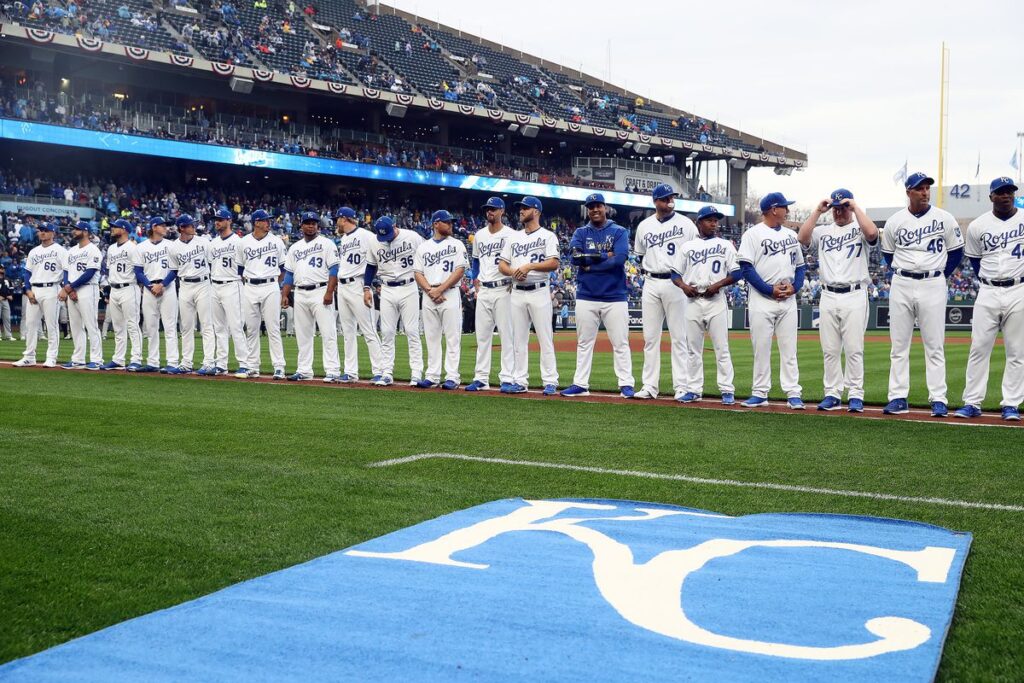Team History
The Kansas City Royals were established in 1969 as an expansion team in Major League Baseball (MLB), bringing professional baseball back to Kansas City after the Athletics moved to Oakland. The team’s name, “Royals,” pays homage to the American Royal, a livestock show, horse show, rodeo, and barbecue competition held annually in Kansas City since 1899. This name was selected through a contest, reflecting the city’s deep-rooted connections to the agricultural industry.
From the outset, the Royals demonstrated a commitment to building a competitive team, focusing on developing a strong farm system. This approach quickly paid dividends, as the Royals became known for their scouting, development of young talent, and innovative playing style. By the mid-1970s, the team emerged as a consistent contender in the American League, setting the stage for their future successes.
The early years of the Royals were marked by rapid growth and an enthusiastic embrace by the Kansas City community. The team’s colors of royal blue and white became symbols of pride throughout the city and the broader region, establishing a strong fan base eager to support their new team.
Foundation and Early Years
The Kansas City Royals, established in 1969, quickly worked to establish themselves within Major League Baseball. Ewing Kauffman, the team’s founding owner, played a pivotal role in bringing the team to Kansas City, emphasizing the importance of community and the development of a family-friendly atmosphere at games. The Royals played their inaugural season at Municipal Stadium, sharing the venue with the Kansas City Chiefs of the National Football League (NFL).
The team’s focus on developing talent from within began to show results in the early 1970s, with the Royals improving their win-loss record steadily. The development of players such as George Brett, a future Hall of Famer, and Frank White, demonstrated the effectiveness of the Royals’ farm system. These early years laid the foundation for the team’s competitive spirit and drive for excellence.
Notable Early Achievements
The Royals’ ascent in Major League Baseball was marked by significant milestones and achievements. By 1976, the team clinched its first division title, signaling the start of a golden era. The late 1970s and early 1980s saw the Royals winning multiple division titles and making their first World Series appearance in 1980. Although they lost to the Philadelphia Phillies, this period established the Royals as a formidable force in baseball, with players like George Brett leading the charge and capturing the imagination of fans nationwide.
Periods of Change
Following their early successes, the Royals experienced periods of change, including fluctuations in performance and adjustments to the team’s roster and management. The 1990s and early 2000s were challenging times for the franchise, as the team struggled to replicate its earlier successes. Financial constraints and the evolving dynamics of Major League Baseball presented obstacles to building a consistently competitive team.
However, the Royals remained committed to their developmental approach, focusing on the draft, international signings, and the cultivation of homegrown talent. This period of change laid the groundwork for the team’s resurgence, as new stars began to emerge and the franchise repositioned itself for success in the new millennium.
Championships and Achievements
The Kansas City Royals have a proud history of achievements, including two World Series Championships in 1985 and 2015. The 1985 World Series win was particularly memorable, as the Royals defeated the St. Louis Cardinals in a dramatic seven-game series, marked by the infamous “I-70 Series.” This victory solidified the Royals’ place in baseball history and remains a defining moment for the franchise.
The 2015 World Series victory, coming after a 30-year drought, showcased the Royals’ resilience and determination. The team’s balanced approach, featuring strong pitching, relentless offense, and spectacular defense, propelled them to victory over the New York Mets. These championships, along with multiple division titles and playoff appearances, highlight the Royals’ enduring legacy in Major League Baseball.
Current Roster
The Kansas City Royals’ current roster is a blend of experienced veterans and promising young talent, reflecting the team’s ongoing commitment to development and competitiveness. The roster is designed to compete in the highly competitive American League Central division, featuring a mix of power hitters, speedy base runners, and skilled pitchers. The team’s focus on cultivating talent from within has continued to be a cornerstone of their strategy, aiming to build a sustainable contender in the years to come.
Management and Coaching Staff
The Royals’ management and coaching staff are tasked with guiding the team to success, both on and off the field. Led by a general manager responsible for player acquisitions, trades, and overall team strategy, the management team works closely with the coaching staff to develop and implement the team’s playing style and approach. The coaching staff, including the manager, pitching coach, hitting coach, and others, play a critical role in player development, game preparation, and in-game decision-making, ensuring that the team performs to its highest potential.
Home Stadium Information
Kauffman Stadium, affectionately known as “The K,” has been the home of the Kansas City Royals since 1973. Renowned for its iconic fountains beyond the outfield fence, Kauffman Stadium offers a unique and enjoyable game-day experience for fans. With a seating capacity of over 37,000, it combines modern amenities with classic design elements, making it one of the most beloved ballparks in Major League Baseball. The stadium’s atmosphere, fan engagement activities, and commitment to family-friendly entertainment contribute to its status as a premier sports venue.
-
*********** ***** ******* *** ***** ** ************ **** ********* *****dd.mm.yyyy 00:00 PM
-
****** *********** **** ** ***** ****** *** **** *** ******: ********* *** ******* *** ****'* ****dd.mm.yyyy 00:00 PM
-
*********-***** ********: **** 6 **** *** ***** *** * ********* **** 7dd.mm.yyyy 00:00 PM
-
**********-************ *******: ****** ****ć, ******* *******, *** * ********* ********** ********dd.mm.yyyy 00:00 PM
-
********* **** ********* ** *** ***: ********* *** ********* ** ****** ******** **. *** *** *****dd.mm.yyyy 00:00 PM
-
****************** ******* **********: *** ********' **** ****dd.mm.yyyy 00:00 PM







